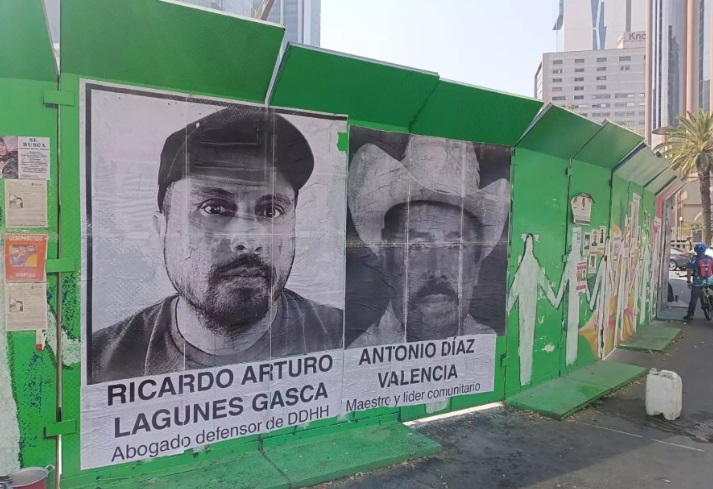We and other organizations went before Special Procedures of the United Nations to request that urgent measures be taken in the disappearance of the human rights lawyer, Ricardo Lagunes Gasca, and Antonio Díaz Valencia, an indigenous community leader from Michoacán, Mexico. They were seen for the last time on January 15. The petition was written jointly with Asesoría y Defensa Legal Sureste, Global Rights Advocacy, IDHEAS, Litigio Estratégico en Derechos Humanos (México) and the University of Seattle International Human Rights Clinic.
An urgent call was submitted to the Working Group on Business and Human Rights, the Special Rapporteur on the Rights of Indigenous Peoples and the Special Rapporteur on Human Rights Defenders to denounce the disappearances. We called for an investigation into the actions of the Ternium company, which practices mining exploitation in the area, and to determine its responsibilities in the context of its obligations to prevent, mitigate and repair for any impacts its activities may cause.
The last time Ricardo and Antonio were seen was when they participated in an assembly in the Aquila community to discuss the mining activity being carried out by the Ternium steel company in the region. The assembly was to discuss the company’s non-compliance with its payment obligations to the community for the mining exploitation in the area. The San Miguel Aquila indigenous community in the state of Michoacán has to coexist with different mining sites. These mining activities have provoked major social and political conflicts in the community stemming from the royalties paid by the company as well as the environmental impacts. Groups of local authorities have also emerged and formed ties with the company, but these people were not elected in keeping with agrarian laws. The community has accused them of diverting funds and making agreements to their benefit with Ternium.
In 2018 there was a conflict between the company and local people opposed to the expansion of mining activity and the ceding of more than 200 hectares of communal lands. Ternium claimed that its operations would be “seriously” affected and that it would have to reduce its iron mining by 80%. That would mean a reduction in royalties payable to Aquila. It was in this context that Ricardo and Antonio advocated for the regularization of said local authorities and compliance with the laws establishing the distribution of the royalties.
The disappearances happened in an area where mining conflicts and situations of violence occur involving the company and armed groups with ties to organized crime networks. Ricardo and Antonio’s work is related to defending indigenous territory, protecting it from projects to exploit natural resources carried out without community consent. There are many reasons to suppose that their abduction and disappearance are linked to different threats they had received.
The Working Group on Business and Human Rights has been aware of actions by companies in Mexico since it visited the country in 2017. At that time, it underscored that “one of the main concerns stemming from human rights violations in relation to companies involves the improper exercise, by the government and businesses, of due diligence on human rights matters in the design and execution of large-scale projects in terms of adequate reparations for damages caused. This is mainly on projects in the mining, construction and tourism sectors, which often affect indigenous communities.”
Our urgent petition to the United Nations called for measures for the State and the company to search for and find Ricardo and Antonio. We especially requested that the State investigate into the company’s responsibility and that the latter participate in the search process, providing information to support the investigation.
Ternium Argentina owns 28.73% of Ternium Mexico. At the same time, the Argentinian company is a member of the Techint Group flat steel producers holding group. According to the information published by Ternium in its 2021 sustainability report, Ternium is a “leading producer of flat steel in Latin America, vertically integrated and with industrial facilities in Mexico, Argentina, Brazil, Colombia, the United States and Central America.” At the same time, Ternium Argentina is a subsidiary of Ternium International.
Who are Ricardo and Antonio?
Ricardo Artuno Lagunes Gasca, 41, is a well-known human rights advocate and lawyer in Mexico, with experience in national and international litigation in defense of territory and the environment. His legal support provided to indigenous communities has been decisive for the protection of thousands of hectares of collective lands, valuable ecosystems and collective rights, especially in indigenous communities.
Antonio Díaz Valencia, 71, is a well-known leader of the Nahua indigenous community in Michoacán. He works in education and the defense of indigenous rights.
Disappearances in Mexico
Disappearances in Mexico are the country’s most serious human rights problem. It is a conflict that cuts across territorial, environmental, public and private sector interests, mixing with drug trafficking and migration policies, and the Mexican State appears to be impotent and lacking useful instruments to seek a solution. More than 110,000 disappearances are officially on record in Mexico, an enormous demonstration of this problem that, as in the case of Ricardo and Antonio, repeatedly targets human rights defenders.
Photograph: @GlorietaMx

